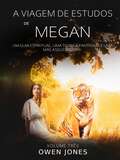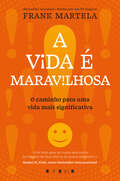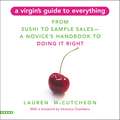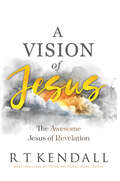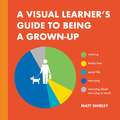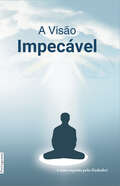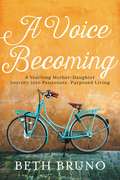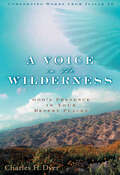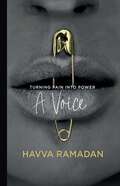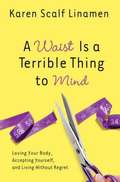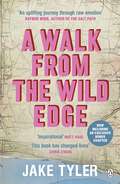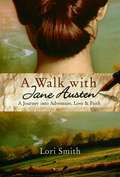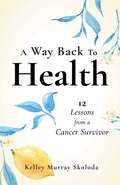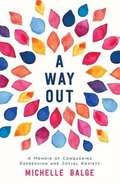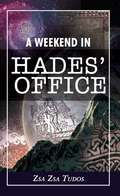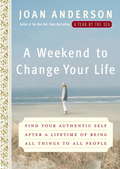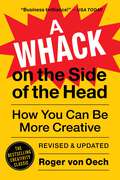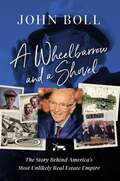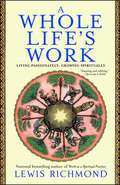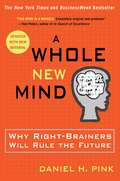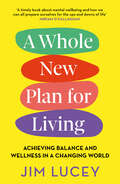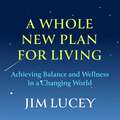- Table View
- List View
A Viagem de Estudos de Megan: Um guia espiritual, uma tigresa fantasma e uma mãe assustadora! (A série Megan #3)
by Owen JonesMegan visita cavernas pré-históricas em um passeio com a escola e sente as vidas dos homens das cavernas! Um guia espiritual, uma tigresa fantasma e uma mãe assustadora! Megan é uma adolescente de 13 anos que percebe que tem poderes psíquicos que os outros não têm. No começo, ela tentou pedir ajuda à mãe, mas encontrou consequências desastrosas e aprendeu a manter suas habilidades especiais em segredo. No entanto, algumas pessoas se ofereceram para ajudar e um animal mostrou uma amizade especial, apesar de não estarem mais “vivos” no sentido normal da palavra. Eles já tinham falecido. Megan tem três amigos: Wacinhinsha, seu Guia Espiritual que havia sido um Nativo Americano Sioux em sua última vida na Terra; seu avô materno, o vovô e uma enorme tigresa siberiana chamada Grrr. Wacinhinsha possui um vasto conhecimento sobre assuntos espirituais, psíquicos e paranormais; seu avô é um “morto” novato e Grrr só pode falar a língua dos tigres, como já se deve imaginar; a maior da sua fala, é claro, é ininteligível para os humanos. Neste episódio da vida de Megan, ela e o resto dos alunos de seu ano na escola são levados em uma excursão. Estes eventos deveriam ser anuais, mas a escola nem sempre tem dinheiro para financiá-los. Esse passeio acaba por ser excepcional para Megan, pois ela consegue ver um vislumbre da vida das pessoas que habitaram aquelas cavernas em uma época há muito tempo passada. Acompanhe Megan enquanto ela tenta aprender mais sobre o passado com a viagem de estudos da escola e leia os conselhos que o seu Guia Espiritual lhe dá sobre as melhores maneiras de se fazer isso!
A Vida É Maravilhosa: O Caminho para Uma Vida Mais Significativa
by Frank MartelaUm guia inspirador que oferece ferramentas práticas e facilmente aplicáveis para uma experiência de vida mais positiva, gratificante e significativa. O que dá sentido à nossa vida? Como podemos lidar com a ausência de um propósito existencial? Valerá a pena focarmo-nos na busca permanente de felicidade? Perceber o sentido da própria existência é fundamental para vivermos com motivação, satisfação e alegria e, sobretudo, para conseguirmos tirar o máximo partido da vida. Vários estudos sugerem que as pessoas com uma forte noção do seu propósito existencial têm mais saúde e vivem mais e melhor. Neste livro, Frank Martela esclarece por que motivo sentimos uma insatisfação permanente e estamos constantemente à procura de algo mais. Numa série de reflexões perspicazes e motivadoras, dotadas de um refinado sentido de humor, o autor analisa as grandes questões existenciais no contexto da vida moderna, oferecendo uma nova abordagem para alcançarmos uma vida mais plena, que passa por fazermos coisas significativas para nós (realização pessoal)de uma forma que nos torne significativos para outras pessoas (realização social). «Um livro para ler vezes sem conta na viagem de descoberta do nosso propósito.» Daniel H. Pink, autor bestseller internacional «Apoiando-se habilmente em áreas como a psicologia, a filosofia e a literatura, este livro irá ajudá-lo a viver uma vida com significado. Uma leitura tão gratificante e divertida quanto enriquecedora.» Emma Seppala, diretora científica do Centro de Educação e Pesquisa sobre Compaixão e Altruísmo da Universidade de Stanford «Um livro brilhante e encantador que aborda as questões mais grandiosas da vida com simplicidade, humor e perspicácia. Se tem curiosidade sobre o sentido da vida — e quem não tem? —, este livro é um recurso valioso.» Roy F. Baumeister, autor bestseller internacional «Neste ensaio edificante, fruto de um cuidadoso trabalho de pesquisa, Frank Martela reúne algumas das ideias mais fascinantes da história, da filosofia e da psicologia para abordar a questão mais premente de todas: o que torna a vida significativa.» Emily Esfahani Smith, autora bestseller internacional
A Virgin's Guide to Everything: From Sushi to Sample Sales--A Novice's Handbook to Doing It Right
by Veronica Chambers Lauren McCutcheonYou can admit it-you're a virgin. Everyone was at one point. And no, we're not talking about sex. We don't care who you've slept with (okay, we do, but that will have to wait for another book). What we're talking about is that you've never before been to a wine tasting, bought real art (posters from college don't count), had a personal trainer, nor known the proper way to eat or order sushi. Life is full of firsts-thankfully this book is here to help. This perfect guide for Virgins, non-and Born-Again Virgins, makes sure that your first times (or second or third) are done right. Filled with advice from Go-to-Girls who are experts in their fields, A VIRGIN'S GUIDE TO EVERYTHING is like having a cool, older sister who's always willing to show you the way.
A Vision of Jesus: The Awesome Jesus of Revelation
by R.T. KendallWhat if Genesis through Revelation is just the beginning of knowing who God is? This book will guide you into a deeper understanding and intimacy with God as you study who He is as the resurrected King. You will have a better grasp of the book of Revelation and who Jesus is revealed in this powerful part of Scripture. The image we have of Jesus is one that affects the way we act as Christians and the way we take the gospel to the world. That image has sometimes been reflected badly because we do not have a fully rounded image of the Jesus we love and worship. Indeed, some modern concepts of Jesus in the church would be difficult to worship. In Revelation 1, Jesus appears in a vision given to the apostle John. It is an awesome, majestic vision. The Bible, perhaps intentionally, doesn&’t give us much information about what Jesus looked like in human form. Yet here in John&’s apocalyptic book, God gives us an image that transcends the incarnation, an image of Jesus we can really focus on. In A Vision of Jesus, respected Bible teacher R.T. Kendall mines Revelation 1 to show readers: The unique promise of the Book of Revelation What Revelation teaches us about how to handle guilt, jealousy, and the unexpected Who God is and how Jesus is the fulfilment of the Old Testament pictures, as well as our great High Priest, the King, and more In these pages, Kendall guides readers toward a faith enriched by a more complete image of the Savior. Engaging and enlightening, this book will inspire Christians to renew their devotion to Jesus and share His transformative love with the world.
A Visual Learner's Guide to Being a Grown-Up
by Matt ShirleyBased on Matt Shirley's popular Instagram account, this smart and hilarious guide is a collection of tables, lists, and charts for all the visual learners out there striving to be a successful grown-up.We all know the particular pain that comes with having to be an actual adult, whether it's resetting your internet password on ten different sites, yearning for an excuse to get out of the plans your wife made for you months ago, or the anxiety that comes from forcing yourself to work out again.When Matt Shirley became fed up with being a grown-up, he started drawing charts as a more fun and efficient way to cope with his frustrations, and stuck them up on Instagram where they became an instant hit. Packed with over one hundred charts, graphs, diagrams, and infographics—with 50 percent brand-new material—this hilarious collection vows to explain everything you need to know about how to be a grown-up, covering work, family, and friends, to dating, breakups, and more.From explaining the cycle of adulthood to decoding the pros and cons of first dates to understanding the corporate lingo translator, Shirley's charts cut to the core of how to be an adult in the funniest possible way.
A Visão Impecável
by Dada BhagwanAqueles que procuram levar uma vida espiritual irão naturalmente perguntar-se como progredir na espiritualidade, e como viver os valores espirituais. Deve-se transcender de alguma forma o bem e o mal, o certo e o errado? Quando é que o desenvolvimento espiritual começa verdadeiramente? Iluminação por definição, o fundamento de uma vida espiritual é uma visão de mundo sem falhas; e para alcançar tal visão, é necessária a autorrealização. No livro "The Flawless Vision", Gnani Purush (personificação do autoconhecimento) Dada Bhagwan declara: "Quando uma pessoa não tem Autorrealização (iluminação espiritual), vê sempre falhas nos outros e nunca pode ver o seu próprio erro". Dadashri explica como atingir o Ser - descrevendo que o conhecimento do Ser é o início da verdadeira espiritualidade. Um resultado automático e um dos sinais mais proeminentes do despertar espiritual, é uma visão sem falhas de todo o mundo. Entre os muitos livros espirituais disponíveis hoje em dia dos professores espirituais, "The Flawless Vision" é uma visão única e preciosa.
A Voice Becoming: A Yearlong Mother-Daughter Journey into Passionate, Purposed Living
by Beth BrunoIn A VOICE BECOMING, Beth Bruno helps mothers cast a Godly vision for their daughters and chart a course that will prepare their daughters for womanhood. What if you as a mother concentrated on your daughter for one year? Who might she become? A VOICE BECOMING is for moms who want to usher their daughters into womanhood but know they need more than tips, techniques, and programs. This is for moms who to desire to chart a course for their daughters that helps them know the story of God they are entering and the global sisterhood of women they are joining. A VOICE BECOMING is written by a fellow sojourner, still in the middle of the journey, processing her own story as she casts a vision for her daughter to discover hers. Sometimes road maps are too restrictive and a friend is needed who has made the journey already. Beth Bruno seeks to activate moms by infusing them with hope and vision. Readers will join Beth in a yearlong journey of teaching their daughters that women lead, women love, women fight, women sacrifice, and women create. Moms learn how to use film and books, tangible experiences, volunteering, interviewing other women, traveling, and more in a creative and life-altering way to help solidify these important concepts in the mind and life of their young teen.
A Voice in the Wilderness: God's Presence in Your Desert Places
by Charles H. Dyer'The Bible is not a sterile Book immaculately conceived in some sort of mystical, holy vacuum. Though God is the ultimate Author, He used human writers as His instruments. And to interpret properly His Word we must enter their world. The bleating of sheep on barren hills, the mournful wail of a ram's horn trumpet on the temple steps, the harsh clang of sword hitting sword in epic battle hang like tapestries in the background of every page.' - Excerpt from A Voice in the Wilderness. Life's struggles can make us feel as if we're wandering in the desert, thirsty for hope and healing. Using Isaiah 40 as a backdrop, best-selling author Charles Dyer takes us on a journey through ancient Judea for a vivid reminder that others before us have known suffering - and, just as God was present for them in their pain, He will walk with us through our wilderness.
A Voice in the Wilderness: God's Presence in Your Desert Places
by Charles H. Dyer'The Bible is not a sterile Book immaculately conceived in some sort of mystical, holy vacuum. Though God is the ultimate Author, He used human writers as His instruments. And to interpret properly His Word we must enter their world. The bleating of sheep on barren hills, the mournful wail of a ram's horn trumpet on the temple steps, the harsh clang of sword hitting sword in epic battle hang like tapestries in the background of every page.' - Excerpt from A Voice in the Wilderness. Life's struggles can make us feel as if we're wandering in the desert, thirsty for hope and healing. Using Isaiah 40 as a backdrop, best-selling author Charles Dyer takes us on a journey through ancient Judea for a vivid reminder that others before us have known suffering - and, just as God was present for them in their pain, He will walk with us through our wilderness.
A Voice: Turning Pain into Power
by Havva RamadanWith a million followers, TikTok and Instagram sensation Havva Ramadan&’s poems have touched the heart and soul of people all around the world. Her highly anticipated debut poetry collection unveils an incredibly powerful and personal journey of loss and love, grief and gratitude, heartbreak and healing, offering poetic inspiration for troubled times.In her first book, poet Havva Ramadan explores the pain of grief, the struggle of mental health, and the journey we all must take to collect our pieces and rebuild ourselves once again. With a mix of her most widely loved poems and previously unpublished material, A Voice is a beautiful collection of Havva's work that shows her deeply personal and relatable journey. Havva&’s words are a light in the darkness for anyone struggling to find their own inner strength and turn their pain into power. And should they stop loving you one day I hope you know that it was nothing to do with your capacity to be loved but their own capacity to live up to the expectations they had built within the love they had displayed unto you. I hope you know that it does not make you unlovable, it just means that this love is no more but that you will be more without it. POWERFUL POEMS: Havva&’s evocative poetry offers validation and encouragement for anyone struggling to find their own inner strength. HIGHLY ACCESSIBLE: The honest, thoughtful, and inspirational reflections in A Voice will resonate with readers of all ages and genders. AFFIRMING AND UPLIFTING: Havva writes with vulnerability, grappling with heavy subjects such as abuse, violence, grief, and death, while remaining uplifting and affirming. SOCIAL MEDIA SENSATION: With a million followers across her TikTok and Instagram accounts—including celebrities such as Khloe Kardashian, Annie Lennox, and Alison Hammond—Havva Ramadan&’s unique and compelling poetic voice has captured the attention and heart of people around the world.
A Volcano in My Tummy: Helping Children to Handle Anger--A Resource Book for Parents, Caregivers and Teachers
by Eliane Whitehouse Warwick PutneyFrom the book jacket: Children often have problems with anger. Teachers often have problems with anger. Parents often have problems with anger. Why? Because we're afraid of anger. It may mean that someone is out of our control. It may mean that someone won't like us. It may mean that someone acts violently. This book is about living successfully, healthily, happily, nonviolently, with motivation, without fear and with good relationships. An accessible resource book for teachers, parents and all who care for children, it is full of stories, and easy-to-use games and exercises designed to encourage children to see their anger and to deal constructively with it. A Volcano in My Tummy includes sections on key concepts, building a child's self esteem, what adults can do when a child is angry, developing an anger management program, troubleshooting, and a special section for teachers that integrates the resource with other curriculum areas. Exercises are clearly described, indicating appropriate age levels, teaching strategies, materials and procedures to follow, with worksheets for the childrens' use. All are easily adaptable for use by teachers, parents or other caregivers.
A Waist Is a Terrible Thing to Mind: Loving Your Body, Accepting Yourself, and Living without Regret
by Karen Scalf LinamenWhat woman looks in the mirror and feels entirely satisfied with the person who looks back at her? Serial dieter Karen Linamen who, like Oprah, is way too familiar with up-and-down weight gain/loss, helps women develop a healthy and positive, yet realistic, relationship with their own bodies. Through her own soul-baring stories and those of others, with her trademark humor and wisdom, Linamen shows women the difference between achieving the perfect body (an impossibility) and coming to terms with the bo...
A Walk from the Wild Edge: ‘This Book Has Changed Lives’ Chris Evans
by Jake TylerThe remarkable true story of one man's inspiring journey through his 3,000 mile walk across the country'A great and inspirational read' MATT HAIG, bestselling author of Reasons to Stay Alive'Inspiring' INDEPENDENT'An uplifting and inspirational journey through raw emotion' RAYNOR WINN, bestselling author of The Salt PathAS SEEN ON BBC BREAKFAST______Jake Tyler had forgotten how to feel alive.With only a pair of boots and a backpack, he set off on a 3000-mile walk around Britain - along coastal paths, over mountains, through every national park.His journey became his road to recovery. On it he rediscovered the British landscape, the extraordinary kindness of strangers and most importantly, his place in the world.This is his inspiring story, away from the wild edge.______'Jake you have changed people's lives . . . we are all fans!' Chris Evans, Virgin Radio'An incredible journey, an inspirational memoir . . . beautiful' Zoe Ball, BBC Radio 2'Inspiring . . . It's something that will help many through these dark times' Bryony Gordon'This book is a tonic. Until we can all get out and explore Britain's beauty for ourselves again, this is the ideal substitute' Mirror'So compelling in his honesty . . . very poignant' Express'A tale told with courageous honesty. There's much to learn here about how reconnecting with nature and trusting others can rekindle the joy of being alive' BBC Countryfile 'A testament to the power of human connection, this is a physical and mental journey to inspire hope even in the darkest of times' National Geographic
A Walk with Jane Austen: A Journey into Adventure, Love, and Faith
by Lori SmithAt thirty-three, Lori Smith found herself falling short of her expectations: single, facing a difficult job, and sinking fast into something like depression. She needed a change. So, instead of waiting for her Darcy to present himself, she makes the long-awaited leap, leaving her job and country to travel through Jane Austen's England. On an adventure of multi-layered discovery, Lori leads readers through Jane's life and the landscapes she knew and loved - from Oxford to Bath, to London and the Hampshire countryside - and through her own emotional landscapes, in which grace and hope take the place of stagnation and despair. Along the way, we explore the small things and the great things, both meanness and goodness in relationships, to discover what Austen herself knew: the joy of life, however ordinary or unexpected.
A Way Back to Health: 12 Lessons from a Cancer Survivor
by Kelley SkolodaKelley Skoloda was the healthiest person she knew—until the day she became a cancer patient. During her first, routine colonoscopy—without having experienced any symptoms—Kelley received a shocking diagnosis: colon cancer. Based on the true story of her subsequent cancer journey, A Way Back to Health reveals how surprising lessons paved the way for her recovery, shares helpful action steps for those who find themselves in a similar situation, and illuminates how personal stories can powerfully motivate and heal. In addition to telling her own story, Kelley also features examples of how other, amazing survivors have learned to manage, survive and thrive in the face of cancer. She also explores how often overlooked actions, such as trusting your instincts, speaking up, getting a second opinion, and watching for miracles, can have a profound impact on recovery—lessons meant to help patients advocate for themselves and help friends, family, and caregivers as they wrestle with cancer and its treatment. Much more prevalent than COVID-19, cancer will affect one in three people directly, and many more indirectly, in their lifetime. A Way Back to Health, with its real-life stories and unexpected lessons, is a helpful and relatable guide to the most important information you need to know about cancer—for the time you need it most.
A Way Out: A Memoir of Conquering Depression and Social Anxiety
by Michelle BalgeWhat do you do when you're trapped in your mind? When you can't escape the feelings of depression and fear? <P><P>A Way Out gives a raw, unfiltered look into the life and thoughts of a young woman, Michelle, experiencing severe depression and social anxiety. Social anxiety plagued her since her early youth, hindering her most as a young adult. She began having suicidal thoughts in her early teens but didn't perceive them as being abnormal. This eventually evolved into a deep depression. Her social anxiety and depression fueled each other, creating a grave cycle of negative thoughts. <P><P>Michelle is able to share her experiences in a way that allows others to go along for the ride with her: the highs, the lows, and the amusingly unexpected. It artfully conveys Michelle's journey through mental illness and toward mental health. Beyond the haunting honesty, A Way Out delivers heart, humour, and hope.
A Weekend in Hades’ Office
by Zsa Zsa TudosA multidimensional existence of earthlings from a macrocosmic view. First in the series of seven The first generation soul Hera - who teaches holistic studies on Earth where she is called Zeta - sends a student up to brother Hades to learn about the universal law and life. Through Mabek's multidimensional travelling Earth becomes only one of the planets in the macrocosm. The broadened horizon brings questions and doubts into his Earthly existence. Being on Ursa Major while living on Earth could make anybody crack however Mabek's curiosity is endless, goes through dimension changes and star gates to follow his task and to find the understanding he seeks. The answers to his questions come from Hades itself via the promised lessons and from Mabek's guide Linaha.The story is a simultaneous account of funny-happy-sad events concerning the same souls in different dimensions. It gives the reader a realistic view of the fights within and the interrelations of energies. You would never look at life the same way again. 5 Mabek's walk through star gates to reach his quarters. On the road he meets his guide, Linaha 6 Zeta, Lenny and Christie discuss the soul giving procedure 7 Hades ponders about the past and present. Tati, his computer is introduced 8 We meet the Earthly Mabek called Zoltan 9 Mabek's doubts about the importance of learning. He also finds the bathroom 10. Zeta's feelings on Earth and Aurora's visit. 11. Hades contacts his wife, Ariadne. The Orion headquarters 12. Mabek and Linaha to organize his thoughts about multidimensional living 13. Zeta faces her past in order to clear the present 14. Mabek meets his earthly astral body 15. Zeta remembers her ex-husband Tamas, who is the earthly soul of Hades. 16. The Alfa & Omega Council on Orion 16th 17. Zeta's communication with the 4th magus, Mekhtani 18. Hades clears happenings in the past 19. Mabek's confusion about timelessness 20. Lenny's questions about life, his guide and goddess Aurora 21. Mekhtani arranges the soul giving 22. Mabek gets ready for the first lesson 23. Hades and Mabek discuss the difference between idea and assumption 24. The students from the centre visit god Mardouk in the Sun 25. Hades arrives to the Council's meeting on Orion 26. Senses and feeling with boundaries. The Tantra exercise 27. Lenny visits the pyramids and the library on Galluba 28. Lesson about the soul, the present and the past 29. The Creator arrives to the Council meeting 30. Mabek and Linaha discuss the first lesson 31. Lenny talks to Zeta about his soul siblings 32. Hades and Mabek about the truth. Aurora's visit 33. Zeta's accounts of the situation on Earth at the end of the 5th Sun Age 34. Zeus explains Keta's situation and the creation 35. Hades finds past documents
A Weekend to Change Your Life
by Joan AndersonNew York Timesbestselling author Joan Anderson gives women practical advice and inspiration for building creative, independent, and fulfilling lives through discovering who they truly are and who they can be. Like Julia Cameron’sThe Artist’s Way, Joan Anderson’s bestsellingA Year by the Searevealed a far larger than expected constituency, in the form of thousands of women struggling to realize their full potential. After years of focusing on the needs of others as a wife and mother, Anderson devoted a year to rediscovering herself and reinvigorating her dreams. The questions she asked herself and the insights she gained became the core of the popular weekend workshops Anderson developed to help women figure out how—after being all things to all people—they can finally become what they need to be for themselves. A Weekend to Change Your Lifebrings Anderson’s techniques to women everywhere, providing a step-by-step path readers can follow at their own pace. Drawing on her own life and on the experiences of the women she meets at her workshops, Anderson shows women how to move beyond the roles they play in relationship to others and reclaim their individuality. Through illustrations and gentle instruction, she illuminates the rewards of nurturing long-neglected talents, revitalizing plans sacrificed to the demands of family life, and redefining oneself by embracing new possibilities.
A Whack on the Side of the Head: How You Can Be More Creative
by Roger von OechThe hugely bestselling creativity classic with &“lasting appeal,&” A Whack on the Side of the Head is now available in an updated and revised edition, inspiring readers to unlock their creative thinking with thought-provoking examples, famous historical anecdotes, mind-bending puzzles, and so much more (New York Times)! For more than four decades, A Whack on the Side of the Head has been a consistent leader in stimulating creativity and innovation. Translated into over twenty languages, Roger von Oech&’s bestselling classic is back—and better than ever! Completely revised, enlarged, and supercharged with new ideas, this definitive edition offers more stories and exercises to bring its famous innovation boosters to a new generation. Learn how to overcome the ten biggest mental locks and unleash your full creative potential. Use the four roles of the creative process—Explorer, Artist, Judge, and Warrior—to generate and apply new ideas. Exploit the power of discontinuity, constraints, and &“playing the Wise Fool&” to find the &“second right answer&”!
A Wheelbarrow and a Shovel: The Story Behind America's Most Unlikely Real Estate Empire
by John BollA Wheelbarrow and a Shovel documents the rags-to-riches success story of John Boll who built a real estate empire by developing manufactured home communities around the world then selling his company to the State of Washington Pension Fund for $2.3 billion.A Wheelbarrow and a Shovel documents the truly remarkable story of one of America&’s most unlikely business success stories. Starting with only a wheelbarrow and a shovel, as well as the same American dream that led his parents to leave their native Holland for the United States, John Boll built a real estate empire in the most unlikely of ways—by developing and improving manufactured home communities around the country. It&’s a rags-to-riches tale that could only happen in America—and only with the hand of God leading the way. Before Boll sold his company to the State of Washington Pension Fund for $2.3 billion, he was the first person to take a collection of mobile home communities to Wall Street.
A Whole Life's Work
by Lewis RichmondWhat is work, truly? In its widest sense, work is not just a job. It is the sum of all our purposeful activities. Seen in this light, work is our whole life. In a continuation of his national bestseller, Work as a Spiritual Practice, Lewis Richmond's latest effort, A Whole Life's Work, explores the many facets of work as a means to cultivate inner life and contribute to the developing consciousness of all humanity. A Whole Life's Work defines eight important modes of work -- the Earner, the Hobbyist, the Creator, the Monk, the Helper, the Parent, the Learner, and the Elder -- along with their corresponding eight modes of inner work: Precepts, Vitality, Patience, Calm, Equanimity, Giving, Humility, and Wisdom. These inner modes are drawn from the author's Buddhist training, but in some form they can be found in most other spiritual traditions, demonstrating the recognition throughout history that our whole life's work has inner as well as outer dimensions. Here Lewis Richmond addresses a primary struggle of contemporary life: how to strike a balance between achievement and ambition on the one hand, and happiness and fulfillment on the other. Whether we are professionals, artists, hobbyists, parents, or students, Lewis helps us recognize the larger picture, too -- our contributions and responsibilities to the wider consciousness of the planet. Through teaching stories, spiritual exercises, and interviews, A Whole Life's Work provides an invaluable roadmap toward the ultimate reconciliation of outer livelihood with inner life, so that when we have grown old we can look back and say: I did the best I could, what I did counted, I am satisfied.
A Whole New Mind
by Daniel H. PinkThe future belongs to a different kind of person with a different kind of mind: artists, inventors, storytellers-creative and holistic "right-brain" thinkers whose abilities mark the fault line between who gets ahead and who doesn't.Drawing on research from around the world, Pink (author of To Sell Is Human: The Surprising Truth About Motivating Others) outlines the six fundamentally human abilities that are absolute essentials for professional success and personal fulfillment--and reveals how to master them. A Whole New Mind takes readers to a daring new place, and a provocative and necessary new way of thinking about a future that's already here.
A Whole New Plan for Living: Achieving Balance and Wellness in a Changing World
by Jim Lucey'A timely book about mental wellbeing and how we can all prepare ourselves for the ups and downs of life' Miriam O'Callaghan'Jim Lucey has put all his experience into this book. It will empower you to update your strategy for a healthy and fulfilling life' Adam ClaytonWe will all experience times in our lives when our health is challenged. As we navigate an uncertain world, stressors such as financial worries, illness, loss, isolation and loneliness can turn into distress, anxiety and depression. In A Whole New Plan for Living, leading psychiatrist Prof Jim Lucey presents ten powerful steps to show us how, by maintaining balance and wellness in our daily lives we can achieve overall health and wellbeing, ready for the challenges life presents to us. From understanding wellness, to managing stress and distress, to the opportunity for mental health recovery no matter the circumstances, A Whole New Plan for Living shows us how by making small changes, we can achieve optimum mental health, become more resilient and live with hope for the future.
A Whole New Plan for Living: Achieving Balance and Wellness in a Changing World
by Jim LuceyThe comprehensive and powerful new book from renowned psychiatrist Jim Lucey.We will all experience times in our lives when our health is challenged. As we navigate an uncertain world, stressors such as financial worries, illness, loss, isolation and loneliness can turn into distress, anxiety and depression. In A Whole New Plan for Living, leading psychiatrist Prof Jim Lucey presents ten powerful steps to show us how, by maintaining balance and wellness in our daily lives we can achieve overall health and wellbeing, ready for the challenges life presents to us. From understanding wellness, to managing stress and distress, to the opportunity for mental health recovery no matter the circumstances, A Whole New Plan for Living shows us how by making small changes, we can achieve optimum mental health, become more resilient and live with hope for the future.(P)2021 Hachette Books Ireland
A Whole New Plan for Living: Achieving Balance and Wellness in a Changing World
by Jim LuceyThe comprehensive and powerful new book from renowned psychiatrist Jim Lucey.We will all experience times in our lives when our health is challenged. As we navigate an uncertain world, stressors such as financial worries, illness, loss, isolation and loneliness can turn into distress, anxiety and depression. In A Whole New Plan for Living, leading psychiatrist Prof Jim Lucey presents ten powerful steps to show us how, by maintaining balance and wellness in our daily lives we can achieve overall health and wellbeing, ready for the challenges life presents to us. From understanding wellness, to managing stress and distress, to the opportunity for mental health recovery no matter the circumstances, A Whole New Plan for Living shows us how by making small changes, we can achieve optimum mental health, become more resilient and live with hope for the future.
